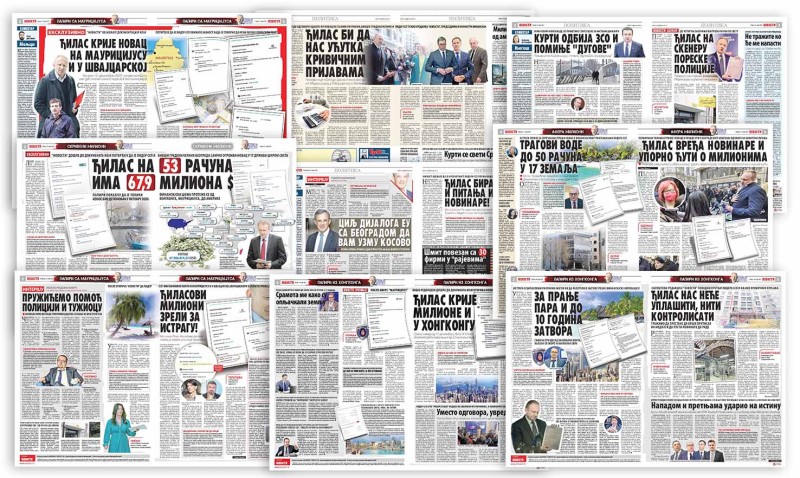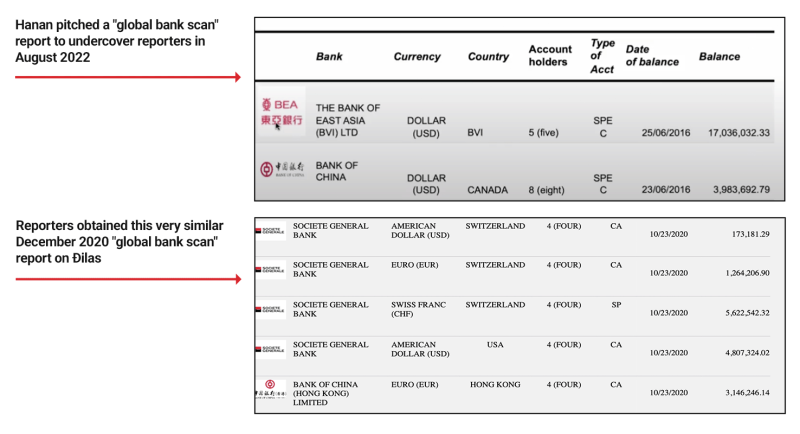As Serbian President Aleksandar Vučić embarked on an official visit to the United Arab Emirates in March 2021, he was under scrutiny due to recent revelations about his government's ties to a murderous organized crime group. But as is his custom, Vučić instead went on the attack, using an opportunity of an interview with friendly media outlet TV Pink to address another subject.
Vučić suggested that a political rival, former Belgrade Mayor Dragan Đilas, was behind the accusations. Vučić then claimed Đilas had illegally stashed his wealth in banks around the world, and predicted that more details would surface shortly.
Six days later, Serbian pro-government newspapers began publishing stories about Đilas’ supposed offshore accounts.
“Đilas hiding money in Mauritius and Switzerland: on 12th of December 2020 he had almost 6.4 million euros in bank accounts in these two countries,” claimed a front-page story in the Serbian pro-government daily Večernje Novosti.
For two weeks, the allegations about Đilas’s supposed offshore millions dominated the headlines. Journalists claimed they had proof the accounts existed, commentators waxed lyrical about money laundering and tax evasion, and officials threatened consequences. Finance Minister Siniša Mali appeared on television brandishing a report that he claimed showed Đilas had dozens of accounts full of stolen money. Serbia’s anti-money laundering chief, Željko Radovanović, pledged to investigate.
But while the media campaign distracted from the revelations about the government’s organized crime ties, the accusations never turned into charges. Đilas, who vociferously denied the allegations, tried to sue Vučić, Mali, and journalists at Večernje Novosti, claiming they forged the bank records to distract from their own “criminal activity,” but a Serbian court declined to take up the case.
Đilas may have been on to something. Evidence collected by OCCRP and its reporting partners suggests the false bank report was likely created by Tal Hanan, an Israeli explosives expert who sells disinformation services.
A source provided OCCRP with a purported copy of the document Mali showed on television. Metadata shows it was created in December 2020, a few months before the accusations against Đilas were first aired. It bills itself as a “deep bank search,” and its formatting looks nearly identical to a report for a service Hanan calls a “global bank scan,” which he pitched to undercover reporters posing as potential clients.
Two sources with knowledge of Hanan’s operations confirmed that he was behind the operation. It is unclear who hired him to produce the document, and Serbian government officials, including representatives of Mali and Vucic, did not respond to requests for comment.
This would not be the first time Hanan has been suspected of selling bank records. Swiss prosecutors previously investigated Hanan for supplying similar information to a Swiss spy named Daniel Moser. As reported by OCCRP’s Swiss partner, Tamedia, prosecutors found Moser paid Hanan $88,000 in 2014 to provide financial intelligence on one of the spy’s targets, but his report turned out to be fake data. (Prosecutors dropped the case against Hanan in 2021, saying they could not show Hanan knew the information he provided to Moser would be used for espionage.)
Hanan denied any wrongdoing when contacted by Forbidden Stories, but has not replied to follow-up questions or requests for comment on the Đilas report.
The "Global Bank Scan"
Hanan has a history of using disinformation and hacking to meddle in global politics.
In mid-2022, undercover reporters working on the Story Killers project approached Hanan’s team posing as intermediaries for a potential client looking to delay an election in Africa. Over several Zoom calls, and one in-person meeting, Hanan and his team pitched their tactics to spread disinformation and derail democracy.
Reporters were able to verify that Hanan’s team has used some of these tactics, like targeted social media campaigns and email hacking, to manipulate political outcomes. Other things he claimed he could do — like locating a target’s bank account anywhere in the world to find compromising material — seemed more far-fetched.
“Now I’ll show you financial intelligence,” Hanan said during one Zoom call.
He opened a document named “Global Bank Scan: Confidential Report” and scrolled down a list of account balances, purportedly belonging to a previous target: Batkhuu Gavaa, a Mongolian lawmaker and businessman who died in 2019. Hanan claimed to have found nearly $232 million in 67 accounts belonging to Gavaa, but he did not explain how he did this.
“It’s not 100 percent,” Hanan conceded. “We estimate 75 percent accuracy, but 75 percent is usually 300 percent more than what they have today.”
James Henry, an economist and lecturer at Yale University, said Hanan’s claims of gaining access to confidential banking information around the world were implausible.
“There is no centralized global banking database, nor could there ever be,” he said. “Anyone who offers this type of access is telling you outright that they are a fraud or engaging in serious blackmail or bribery of officials within specific banks”
The layout of the Gavaa report displayed by Hanan closely resembles the report on Đilas obtained by reporters, though there is no company branding on either.
Hanan’s group, which refers to itself as “Team Jorge,” is not registered as a company and does not use branding, preferring to remain in the shadows. When the undercover reporters met Hanan in a nondescript office building in Modi’in, Israel, in December, the disinformation expert explained: “You saw what it says on the door, right? It says nothing. That’s who we are: We are nothing.”
Forging Accounts
The lawsuit Đilas filed against Vučić, Mali and journalists at Večernje Novosti was rejected by the court, but the case produced a telling detail: The first reporter who published the story in the pro-government daily said she received the bank records “in an anonymous shipment to her by an anonymous source probably aware that she was a journalist.”
Her stories highlighted two alleged foreign accounts belonging to Đilas — one with Deutsche Bank in Mauritius and the other with Societe Generale Switzerland — totalling some 6.4 million euros. But although she and other pro-government journalists wrote dozens of stories about these accounts, neither of them was real.
Deutsche Bank did not have a branch in Mauritius at that time, and Societe Generale in Zurich issued a letter confirming that the account number attributed to Đilas did not exist.
Đilas said he had previously opened a company in Switzerland with permission from Serbia’s national bank, but that the bank account attributed to him did not exist.
“I've really never had an offshore account,” he told OCCRP’s Serbian member center KRIK.
According to evidence obtained by OCCRP, Aron Shaviv, a political consultant who has worked with Israeli prime minister Benjamin Netanyahu, may have been involved in connecting the Serbian government to Hanan.
Shaviv confirmed to reporters that he had worked on the Serbian president’s campaign in 2017, but denied involvement with Hanan.
“I was introduced to ‘Team Jorge’ once in early 2019 and have had no business or any transactions with them,” he told OCCRP. “If my name has been used by a third party involved in this case to establish credibility - it is without my knowledge and highly regrettable.”
Đilas said he had long suspected the Serbian government was behind the fake reports, but never had proof. “After all, who was the first to announce that I had those accounts?” he said.
While the secret bank account allegations were new to Đilas, the smear campaigns have been around for years. He and Vučić were rivals in a race for the mayor of capital city Belgrade in 2008. Vučić lost then, and again four years later.
But in 2012 Vučić and his Serbian Progressive Party came to power on the national stage, and the anti-Đilas narrative has been pervasive in the pro-government media since then, painting Đilas as a rapacious businessman who illegally made over 600 million euros through his companies.
“[T]hey declare me a thief, a criminal, that I have a billion euros, and so on,” Đilas said.
“You cannot fight against fake news, especially when it is a coordinated campaign with enormous amounts of money invested in it.”









